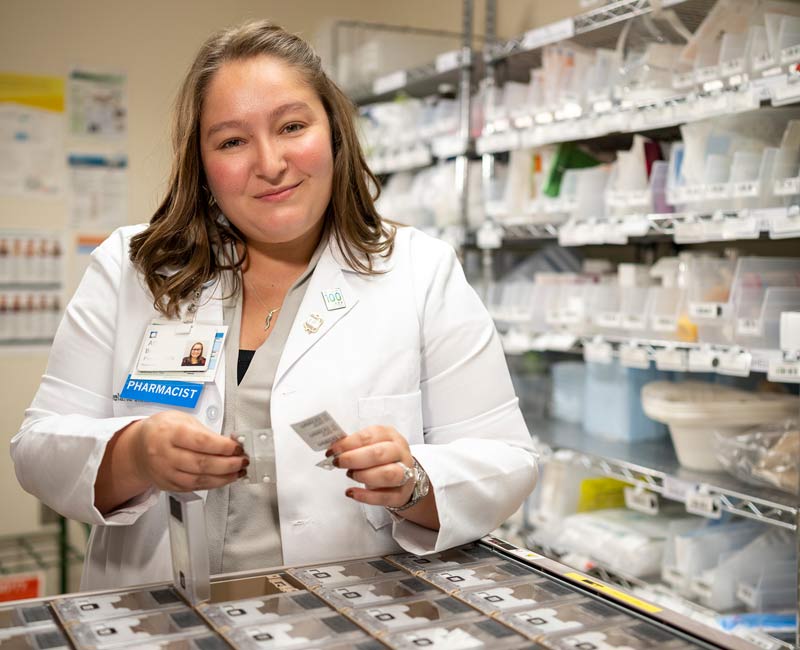A pharmacist is a healthcare provider who works with medications. There are many different types of pharmacists. You’ll most likely work with one who fills your prescriptions. Your pharmacist is also an important member of your healthcare team. They work with your doctor and other providers to make sure your medications are safe and effective.
Advertisement
Cleveland Clinic is a non-profit academic medical center. Advertising on our site helps support our mission. We do not endorse non-Cleveland Clinic products or services. Policy

Image content: This image is available to view online.
View image online (https://my.clevelandclinic.org/-/scassets/images/org/health/articles/24786-pharmacist)
A pharmacist is a healthcare provider and medication expert. They make sure your medications are safe and the right ones for your needs. Some pharmacists also:
Advertisement
Cleveland Clinic is a non-profit academic medical center. Advertising on our site helps support our mission. We do not endorse non-Cleveland Clinic products or services. Policy
Pharmacists can help you manage and improve your health. They work with your primary care physician and other providers to make sure you receive the best possible care.
Yes, pharmacists are doctors. They earn a Doctor of Pharmacy (PharmD) degree. In this role, they become experts in all prescription and over-the-counter (OTC) medications. A PharmD makes sure all of your medications are safe and effective.
Pharmacists aren’t medical doctors (MDs) or doctors of osteopathic medicine (DOs). They can’t diagnose or treat illnesses and other health conditions. But they are doctors who are an important part of your healthcare team.
Pharmacists have many different responsibilities. Depending on the type of pharmacist, they may:
Advertisement
There are many different types of pharmacists. These are some of the main ones.
A community pharmacist works in a retail store, like a chain drug store or an independently owned pharmacy. Community pharmacists give you your medications. They also answer any questions you may have about your prescriptions. They can answer questions about over-the-counter (OTC) medications and any health concerns you may have, too. Community pharmacists also provide services, like giving vaccines.
A clinical pharmacist works in a hospital, clinic or another healthcare setting. Clinical pharmacists usually don’t spend time filling prescriptions. They’re more involved in direct patient care. They may work with your doctor or other members of your healthcare team while you’re in the hospital. They may also care for you one-on-one in an outpatient office to help you manage certain conditions, like having high blood pressure or diabetes. Clinical pharmacists recommend which medications you should get. They can also oversee how much and when you should take those medications.
A hospital pharmacist works in the pharmacy at a hospital. Hospital pharmacists focus most of their time checking orders and preparing medications. They work with doctors and nurses during your hospital visit to make sure your medications are right for you. This may include medications that you take while you’re in the hospital (including IVs). Or it may be medications your doctor prescribes for you to take when you leave the hospital.
A consultant pharmacist advises healthcare companies and insurance providers on patient medication use. They also work to improve pharmacy services at hospitals and other healthcare facilities. Consultant pharmacists may also give healthcare advice. For example, they may help people over the age of 65 manage their prescriptions.
A nuclear pharmacist prepares and delivers radiopharmaceuticals for use in nuclear medicine tests and procedures. Radiopharmaceuticals contain radiation, but they’re safe. Radiopharmaceuticals are an important part of nuclear medicine imaging. They help treat certain medical conditions. A nuclear pharmacist has years of training in radiation safety and handling radioactive materials.
Pharmacists work in a variety of settings, including:
Pharmacists and pharmacologists both work with medications. But their jobs are very different. Pharmacists prepare and give you your medications. Depending on the type, they may provide direct patient care. Pharmacists have to earn a PharmD degree to practice.
Pharmacologists are research scientists. They focus on developing and discovering new drugs. They design and run clinical trials. They learn about how drugs will affect bodies. They may also help create safety guidelines for new medications. Pharmacologists usually earn a Doctor of Philosophy (Ph.D.) degree in pharmacology.
Advertisement
A pharmacist is more than just someone who hands you your medication. Pharmacists play a key role in helping you manage and improve your health. As they know so much about medication, they’re an important member of your healthcare team. They can work closely with your doctor and other healthcare providers to make sure you get the correct information and assistance with your health. That way, they can help ensure you’ll receive the best possible care.
Advertisement
Learn more about the Health Library and our editorial process.
Cleveland Clinic's health articles are based on evidence-backed information and review by medical professionals to ensure accuracy, reliability, and up-to-date clinical standards.
Cleveland Clinic's health articles are based on evidence-backed information and review by medical professionals to ensure accuracy, reliability, and up-to-date clinical standards.
Cleveland Clinic’s primary care providers offer lifelong medical care. From sinus infections and high blood pressure to preventive screening, we’re here for you.
